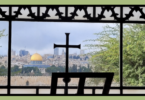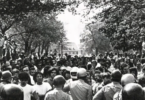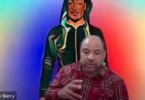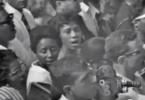A STATEMENT ON RACISM AND THE CHURCH
Racism has been defined as an institutionalized socioeconomic system or a pattern of behavior “which divides people into groups identified by characteristics of origin or color for the purpose of establishing and perpetuating, on the basis of those characteristics, the subordinate status and the denigration and exploitation of one group to the benefit of the other.”i
The church must declare that racism is sin. The Moravian Catechism describes sin as disobedience to the known will of God.ii God’s will is made known to us in Jesus’ teaching that we are to love God and love our neighbor as we love ourselves (Mark 12:29-31). Racism then is sin, because it contradicts the teaching of Jesus and violates the known will of God.
The sin of racism is also evidenced in its violation of God’s call for the members of Christ’s church to be reconciled to God and one another and to be engaged in a ministry of reconciliation in the world (2 Corinthians 5:16-21). Contrarily, racism separates and perpetuates divisions, thus denying the unity of the church proclaimed in Holy Scripture: “As many of you as were baptized into Christ have clothed yourselves with Christ. There is no longer Jew nor Greek, there is no longer slave nor free, there is no longer male nor female; for all of you are one in Christ Jesus. And if you belong to Christ, then you are Abraham’s offspring, heirs according to the promise” (Galatians 3:27-30). Through its struggle with the issue of including outsiders, the early Christian church discovered that God shows no partiality (Acts 10:34) and that Christians are called upon to do likewise (James 2:1).
The Ground of the Unity states, “The Unitas Fratrum recognizes no distinction between those who are one in the Lord Jesus Christ. We are called to testify that God in Jesus Christ brings His people out of ‘every race, kindred and tongue’ into one body, pardons sinners beneath the cross and brings them together. We oppose any discrimination in our midst because of race or standing, and we regard it as a commandment of the Lord to bear public witness to this and to demonstrate by word and deed that we are brothers and sisters in Christ.”iii Further the Moravian Covenant for Christian Living teaches that Moravians oppose any discrimination based on color, gender, race, creed, or land of origin.iv
The Moravian Church, despite sound biblical teaching and clear statements of belief, has, from time to time, demonstrated the values of the surrounding world and thus has denied the very affirmation it professes. It has been affected by the very racism that is contrary to our beliefs.
As evidence, we identify:
✷ an absence of racial diversity in some areas of the workplace and the classroom;
✷ the disproportionate number of black and biracial churches that have been arson victims;
✷ the segregation apparent in our church’s worship life and congregational life in general, and the tendency of congregations and Provincial Elders’ Conferences to extend calls only to pastors of the same race as the congregation;
✷ the absence of widespread dialogue on the issue and the resulting congregational inaction to overcome the effects of racism in our society in housing, health care, and equitable salaries; and
✷ the inability of the majority to hear the expression of frustration, pain, and anger on the part of minority peoples or even to recognize the hostility growing out of their experiences in our society.
The church of Jesus is called to be salt and light:
✷ to set an example and show the way for a society which cries out for racial healing;
✷ to match our fine statements with worthy deeds;
✷ to confess the sinfulness of our failure to practice what we preach about discrimination;
✷ to examine our personal and corporate life and repent; and,
✷ under the guidance of the Holy Spirit, to turn from our racism and take a new direction in keeping with the teachings of God in Christ Jesus.
Thus the church shall practice racial inclusion in every area of its congregational and denominational life; and individual Christians and congregations shall work actively to identify and eliminate the patterns of discrimination both within the church and within society at large.
Adopted by the 1998 Synod • Reaffirmed by the 2018 Synod and 2022 Synod.
i Arthur Freeman, “The Cross and Racism,” paper presented to the World Faith and Order Conference, January 27, 1992, p. 1.
ii Provincial Synods of Moravian Church in America, Northern and Southern Provinces, 1956. “Catechism of the Moravian Church in America for the Instruction of Candidates for Confirmation and Church Membership,” reprint (Bethlehem: Interprovincial Board of Publications and Communications, 1994), p.18.
iii Synod of the Unitas Fratrum 1995, The Ground of the Unity, A Doctrinal Statement, p. 6.
iv The Moravian Covenant for Christian Living (Bethlehem: Interprovincial Board of Publications and Communications, 1982), Section V, p. 32.






